Statehouse races and leadership changes: What to know about Kentucky's primary election
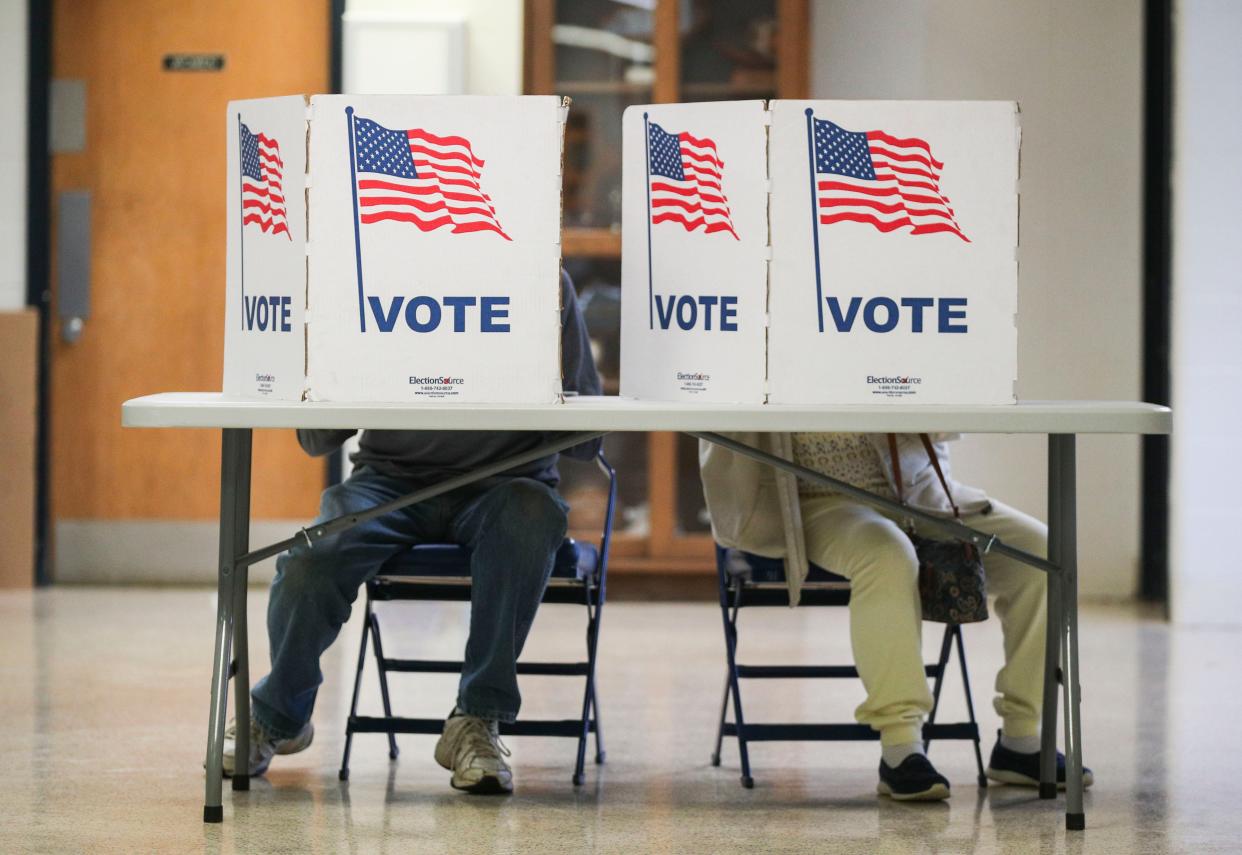
- Oops!Something went wrong.Please try again later.
- Oops!Something went wrong.Please try again later.
- Oops!Something went wrong.Please try again later.
Dozens of legislators who spent their winter in Frankfort have been making up for lost time on the campaign trail since the legislative session ended last month.
It's primary election season in the Bluegrass State, with a full slate of races to determine who will be on the ballot in November. Every state House of Representatives seat is on the line, along with plenty of other offices across Kentucky's 120 counties.
Keturah Herron, a Louisville Democrat, has it easier than most. The incumbent state representative is running unopposed for an open state Senate seat, without an election to worry about next week. Still, she's keeping a close eye on what transpires Tuesday once voters leave the polls.
"I think it's important to allow people to have options," Herron said in April, as she drove from Louisville to Frankfort in the days following the end of the legislative session. "... You've got to stay true to what your moral compass is, and also the promises that you made to your constituents."
The 2024 General Assembly began on Jan. 2 and didn't wrap up until April 15, leaving about five weeks for incumbents running for office to get out and meet with constituents and take part in forums.
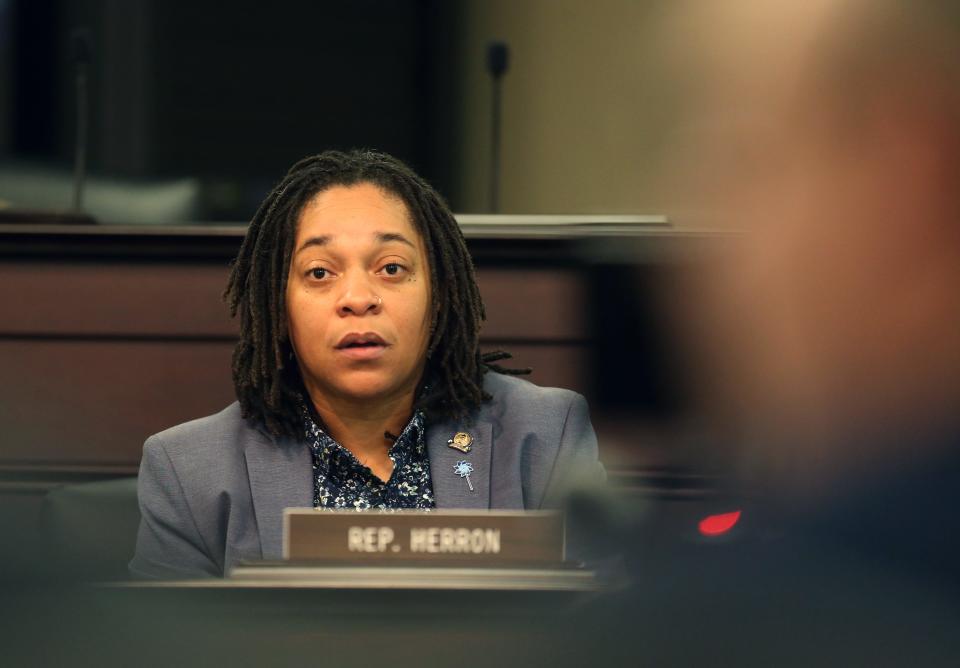
It was a lengthier-than-usual session as lawmakers hammered out a two-year state budget and approved bills to increase penalties for violent crime and crack down on homelessness, study a potential split of Jefferson County Public Schools and provide new maternal health measures, among other legislation.
The general election won't take place until Nov. 5, and this year's slate doesn't include statewide offices such as governor, attorney general and secretary of state. Those races were decided last fall.
But Tuesday will be a pivotal moment for 187 candidates vying for the 100 House seats, 37 candidates running for 19 Senate seats and individuals hoping to win other offices such as Louisville Metro Council seats, with 10 districts on the ballot.
The list in Louisville: Here's who is running for the 2024 Kentucky legislature in Jefferson County
Kentucky's six U.S. House seats are up for grabs as well, though challengers for those seats face long odds, along with presidential primaries ahead of the presumed November race between Joe Biden and Donald Trump.
The election will also set the table for transition during the 2025 General Assembly. Damon Thayer, a Georgetown Republican, is leaving office and ending his run as the state GOP's longest-serving Senate floor leader, while House Minority Floor Leader Derrick Graham, a Frankfort Democrat, is leaving the legislature as well.
Polls opened for early voting Thursday. And as Election Day approaches, here's a look at what's at stake:
Big names, big races
Thayer is a Frankfort institution at this point, with a dozen years as the GOP's Senate floor leader under his belt. He has said he's leaving office over "exciting private sector opportunities," though at 56, he hasn't closed the door on a return to politics in the future.
House and Senate leaders are elected by their caucuses ahead of the start of a new legislative session. In an interview last month with KET, Thayer said he believes Julie Raque Adams, a Louisville Republican and current majority caucus chair who's been in Frankfort since 2011, is a natural fit to follow him. She has not publicly commented any interest in the role.
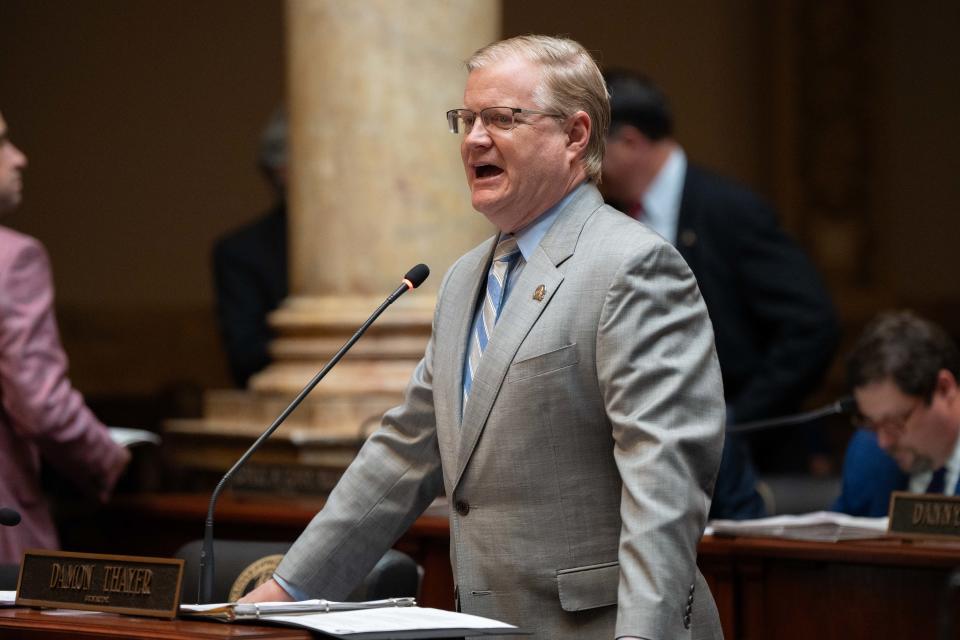
Speaking last month with The Courier Journal, Sen. Adrienne Southworth — a Lawrenceburg Republican locked in a high-profile primary against two former Navy SEALs — joked Thayer had done a good job "babysitting all of us" during his time as leader.
She didn't throw her support behind any potential candidate, but said whoever takes on the role will have a tough task leading more moderate Republicans in the chamber along with its further-right "liberty" wing members.
"I have thought through multiple times around the whole entire room, 'OK, who has the skills to do what needs to be done?' And unfortunately, it's not very many people," she said. "Can somebody grow into that position? They're going to have to. But I have thought about also, on the other hand, who would be someone that people would trust in that position? There's so many factions and nobody can trust each other."
The comments from Southworth, a divisive figure in the party whose primary is one to watch, illustrate the visible divide between the two Republican factions playing out in several primaries across the state.
In Boone County, for instance, supporters of candidate T.J. Roberts (including U.S. Rep. Thomas Massie's Making A Sensible Shift In Elections PAC) have poured more than $53,000 into his campaign against C. Ed Massey, a more traditional former legislator who lost the seat two years ago to current Rep. Steve Rawlings, who's now running for a state Senate seat.
Massey's campaign has raised nearly $90,000 for the race, though he caused controversy at a recent forum when he accused Roberts without evidence of having an account on LGBTQ+ social networking app Grindr.
And Nicholasville Republican Killian Timoney, who has crossed party lines to vote with Democrats on multiple occasions since taking office in 2021, is facing a challenge from Thomas Jefferson, whose donors have raised more than $13,000.
Jefferson is backed by the Jessamine County Republican Party, which passed a censure resolution against U.S. Senate Minority Leader Mitch McConnell in 2022 over gun legislation he supported following the school shooting in Uvalde, Texas.
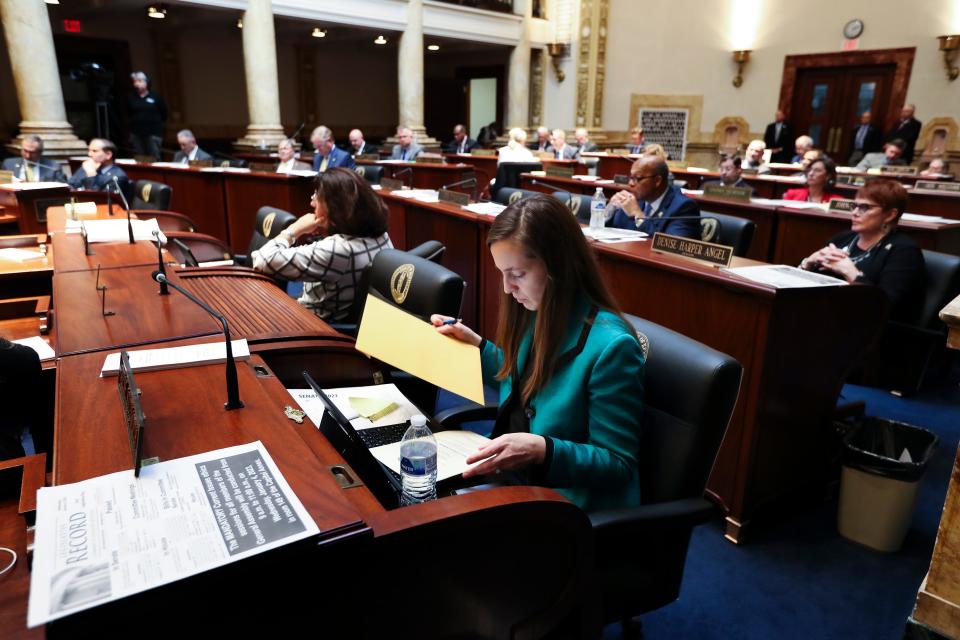
The divide between the two sides had an impact on the 2024 legislative session.
Republicans had no trouble passing legislation popular with most members of the party — including the budget and House Bill 5, a sweeping anti-crime bill that boosts penalties for violent crimes, outlaws sleeping in streets, limits charitable bail organizations and takes other steps criticized by Democrats.
But Rep. Daniel Grossberg, a Louisville Democrat, said he believed GOP infighting prevented them from approving other measures, such as bills that would have put limits on drag performances and diversity, equity and inclusion offices at Kentucky universities.
"They're having a power struggle, and in a fiscal year they're required to pass a budget, so other things wind up on the back burner," Grossberg said in late April after a campaign stop in his district (the first-term legislator is facing a primary challenge from Mitra Subedi, a Bilingual Associate Instructor at Fern Creek High School). "And when there's a lot of bad policy, as much as I wanted my good policies to pass, I am more grateful that the bad policies got stalled."
In his April interview with KET, Thayer said "fringes" exist in both parties. While he didn't offer names of lawmakers he plans to support in primaries, he said he'll campaign for “normal Republicans — someone who wants to help put the fire out that’s burning in America today.”
"I believe there are members of both parties on the fringes who would rather pour gas on the flames and walk away and run to their Twitter feeds or to CNN or to Fox News to talk about it, and brag about it gleefully. That’s not me," he told host Renee Shaw. "I’m going to focus on trying to elect Republicans who are focused on solutions to help move Kentucky forward."
Democrats in the House, meanwhile, are looking for a new leader of their own, with Graham planning to vacate his seat in Frankfort after more than two decades in office.
With a 100-member chamber that included 20 Democrats this session, the field to replace Graham will likely be larger than the one to fill Thayer's shoes in the Senate. Herron said she expects the slate of possible candidates to become more clear after the November election — it's a strong caucus, but "unfortunately, some of our people who are there now have some pretty tough generals."
Grossberg said he looks for "someone who can command the authority and respect of the caucus and of the majority party to advance our policies" when he considers candidates who he would support to take over as the Democrats' next floor leader.
"We're not going to be the majority immediately. It's going to take time," he said. "I'm looking for someone who's going to be able to help us stop bad policies and advance good policies."
In Frankfort: How Kentucky Democrats got a few bills ― 7, in all ― across the finish line this session
Turnout and the presidential impact
Those candidates could be determined by what happens in Tuesday's primaries — and by who shows up to vote.
Voter turnout rises in Kentucky and across the nation when a presidential race is on the ballot in November. In six even-year elections between 2012 and 2022, general election turnout in the Bluegrass State was 14.1% higher on average in years when presidential candidates were listed (59.7%) over years without a race for the White House (45.6%).
Turnout is lower in primary races, generally hovering between 20% and 30%, but is likely to be higher in presidential years. Kentucky's peak since 2012 came in 2020, when 31.1% of registered voters cast a ballot in the primary.
In 2023, when the state's six statewide offices were up for grabs, 14.5% of voters participated in the primaries while 38.1% voted in November.
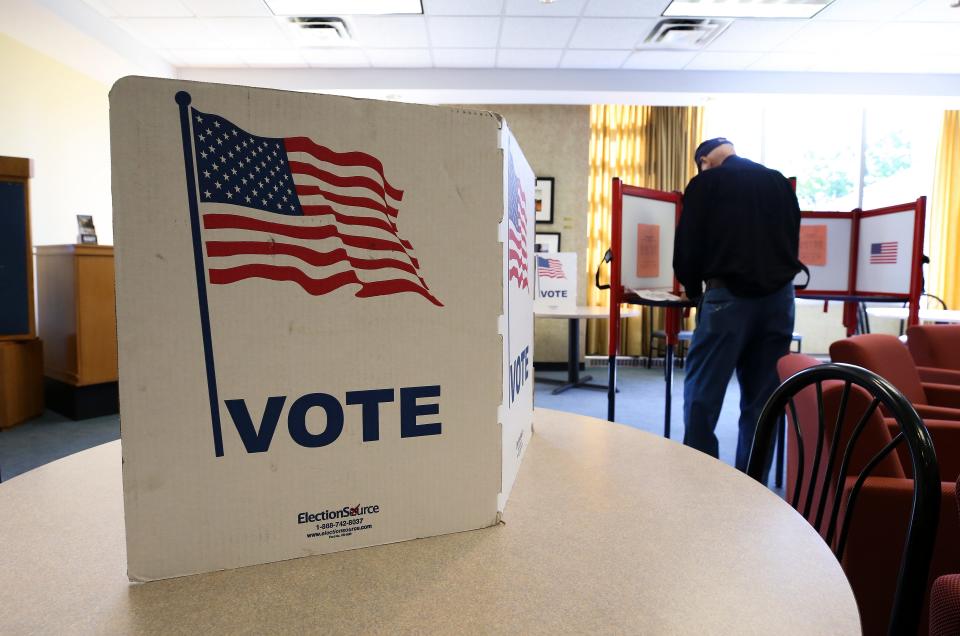
Secretary of State Michael Adams joked that many voters have it "a little backwards" — Kentucky is a safe bet to go to Trump this fall, as it has by overwhelming margins in 2016 and 2020, while turnout was significantly lower in years like 2023, where more races likely to be competitive were at stake.
He didn't have an official projection during a mid-April interview with The Courier Journal but said he expected turnout this May to be over 25%. He revised that count in early May, though, telling Spectrum News he was "dialing that back" to somewhere between 10% and 15% — "that's partly because we disenfranchise Independents and don't let them vote in (Kentucky) primaries."
Trump's popularity in Kentucky could draw more Republicans to the polls this month, although GOP candidates won't be matched up against Democrats until November. But not everyone is convinced.
Herron said she expects the presidential race to have a bigger impact in the general election than in the primaries, though she said she's tried to bring attention to the Jan. 6 riot at the U.S. Capitol and the pending federal indictments against Trump to encourage more Democrats to head to the polls, as well.
Western Kentucky University political science professor Jeffrey Budziak, meanwhile, said the shadow of Trump and Biden will hang over primary elections this year, and their effect on voter turnout could shift a number of races in November.
Primary elections tend to bring out "really high-information voters" who are actively engaged in politics and are more likely to know more about local and state races than voters who hit the polls once every four years to vote for their next president.
Voters in both parties have known for months who the Democratic and Republican presidential nominees will be this year, but those races are still likely to bring more voters to the polls in May. Budziak said that shift in turnout could affect down-ballot races, with more voters who are less knowledgeable heading to the polls.
That could help candidates who are already in office and came into the races with name recognition, he said.
"If I were fighting an uphill battle to challenge an incumbent, what I would actually want is a relatively low-turnout election where I tried to find my people and say, 'We're going to get them (to the polls),'" Budziak said, citing current U.S. Rep. Alexandria Ocasio-Cortez's primary win as a challenger in the low-turnout 2018 New York Democratic primary. "If I were a challenger here, that would be something I'd be hoping for."
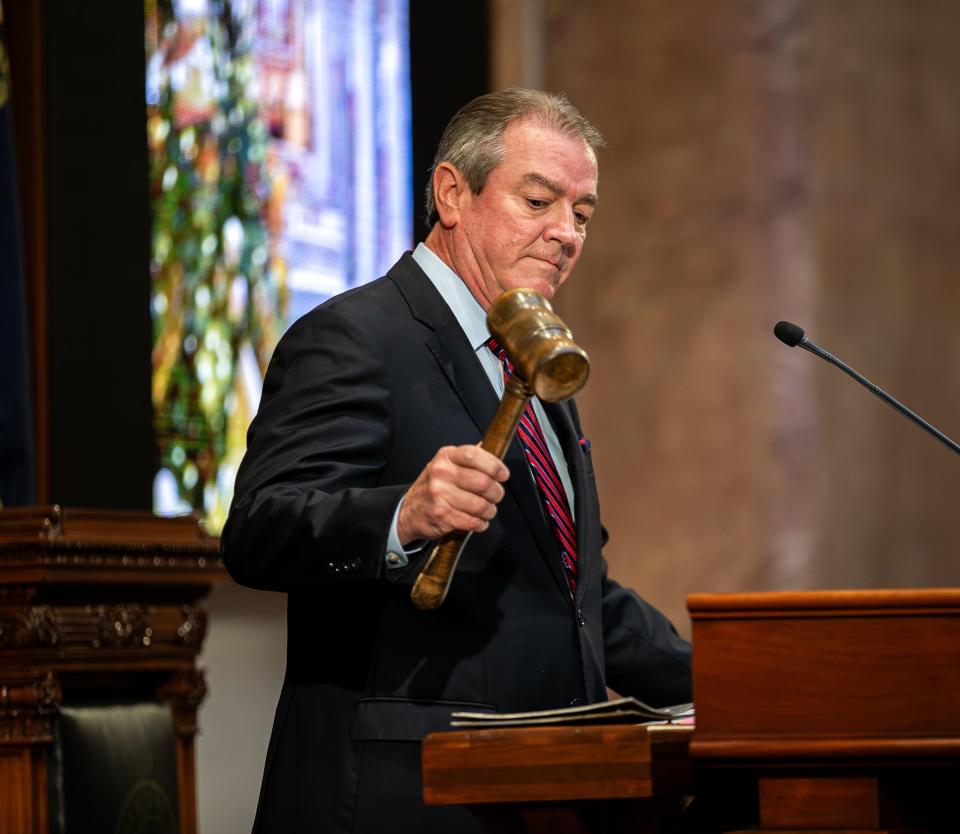
House Speaker David Osborne, a Prospect Republican, isn't facing a primary challenger this year. But after nearly 20 years in office, he knows a thing or two about winning them.
In primary races, he said, candidates try to "drill down to the base" and engage with their party. Politics in recent years especially have been overwhelmed by "toxic" rhetoric that has started at a federal level and become more prevalent locally — "I really believe it's fueled so much by social media, that everybody is now an activist even though they were (previously) just a casual, interested government advocate."
The intensity has risen, he said. But that's driven away some voters in turn, he said, and it's an electorate he thinks could swing races.
"Everybody, for the most part, in primaries is singing from the same hymn book," Osborne said. "So the people that can present themselves as that person who is able to get things done, who is able to work with others, I really think that gives them a leg up."
Reporter Hannah Pinski contributed. Reach Lucas Aulbach at laulbach@courier-journal.com.
How to vote
Registering to vote: Registration to cast a ballot in the primary ended on April 22. However, registration to vote in the general election is open until Oct. 7. You can sign up through a portal on the secretary of state's website (www.sos.ky.gov).
Election schedule: May 21 is for primaries. Early voting in the general election can take place from Oct. 31 to Nov. 2. Election Day is set for Nov. 5.
Races on the ballot: U.S. president, all U.S. House of Representatives seats, all Kentucky House seats, odd-numbered Kentucky Senate Seats and several other local races.
IDs allowed at the polls: Driver's license, military ID, county-issued voter ID, student ID from a state college or postgraduate technical or professional school.
This article originally appeared on Louisville Courier Journal: Kentucky Primary Election 2024 has high stakes for legislative races

